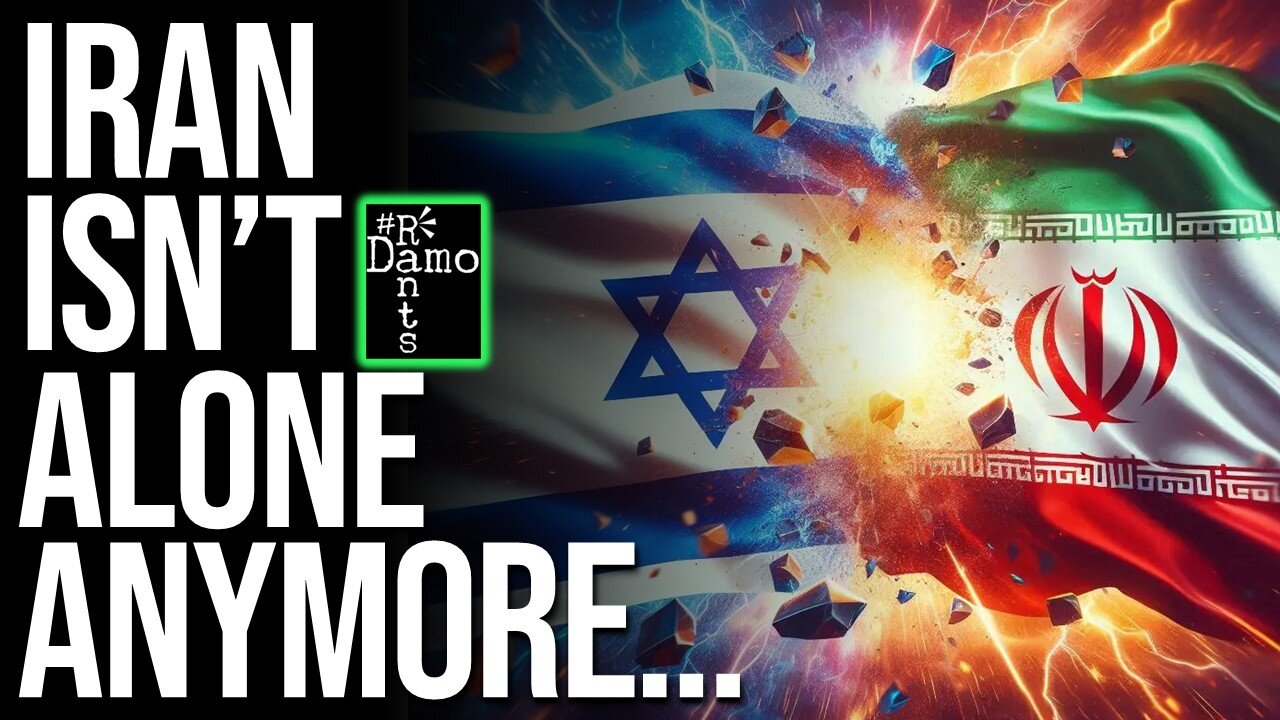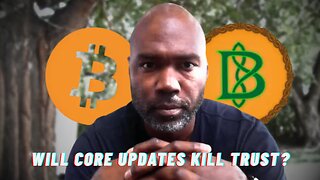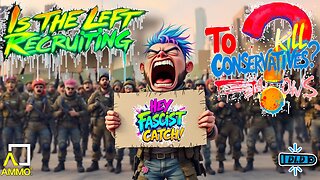Premium Only Content

Iran Just Slammed Israel Again - Without Firing a Single Shot
Right, so Israel may have claimed victory following their 12-day blitz against Iran – Iran and many others certainly dispute that claim - but as the smoke has cleared, it's Iran that's digging in—and it's not doing so alone. While Israeli jets raced home and their diplomats declared success and Benjamin Netanyahu is kissing Trump backside with letters to Nobel Peace Centre, Beijing has been quietly shipping surface-to-air missile batteries and upgrading Tehran’s radar systems. The ceasefire still currently holding between Israel and Iran is more and more becoming cover for ulterior motives and whilst we know Netanyahu wants Trump’s assent to strike Iran again, for Iran its all about preparing for that eventuality and they’ve got Chinese help to do it. This also isn’t just about missiles or reactors anymore, but also structural realignment in the Middle East. It’s about trade routes, energy corridors, and the rise of a new strategic axis in opposition to the one centred in Tel Aviv and Washington - this one built in Tehran and Beijing. So how will this shape the Middle East going forwards new conflict or not?
Right, so twelve days of ferocious exchanges between Iran and Israel last month may have ended in a ceasefire, but the tremors their actions triggered are still very much rumbling away. While Israel claimed tactical success, having struck key Iranian nuclear and military sites, it was also the one that readily agreed to a Trump instigated ceasefire which Iran simply agreed to – hardly the actions of someone winning a conflict, but it now faces a transformed landscape too: a fortified Iran, politically emboldened and militarily reinforced by its alliance with China.
In the immediate aftermath of Israel’s airstrikes on Natanz, Isfahan, and Fordow, the sites of Iran’s nuclear research, Iran, like Israel has had to count the cost of the damage, publicly they have declared it to be nowhere near as bad as the US and Israel have claimed, but time will tell. However Iran has not been dwelling on the damage caused, they’ve moved swiftly to reinforce and rebuild knowing what an Israeli ceasefire is worth of course. According to Middle East Eye, Iran began deploying Chinese-made HQ-9B surface-to-air missile batteries within days of the ceasefire, fortifying key sites and reshaping its air-defence architecture to repel future Israeli incursions. The Cradle similarly reported that these Chinese systems offer a marked upgrade over Iran’s older, Russian-supplied S-300s and domestically produced Bavar-373s, providing enhanced detection range, target-tracking precision, and multi-layered coverage.
Iran’s air-defence overhaul is not cosmetic, Israel were very much penetrating it. These systems are being integrated with existing radar and missile assets, so they are readily in place should Israel attack again and their deployment signals acknowledgement of vulnerability that needed to be addressed and that Iran have been able to do so quickly, in contrast to Israel running out of extremely expensive interceptor missiles provided by the US, which are now in short supply globally.
But why would China risk entanglement in a volatile region by supporting Iran militarily so overtly? Part of the story I’m sure lies in a shared sense of antagonism toward US and Western dominance, but as Defence Security Asia have reported, the HQ-9B batteries delivered to Iran post-ceasefire were part of a long-negotiated arms package, with the possibility of future J-10C multirole fighter sales still on the table.
But China’s interests are not purely military. Iran offers discounted energy, strategic depth, and access to critical overland trade corridors as well, showing it is very much a move in China’s interests. The Belt and Road Initiative (BRI), which has already weakened in the Levant, gains renewed vigour through Iran’s inclusion in the China-Iran 25-year cooperation agreement.
Moreover, China’s support for Iran serves to drain US resources, force Israel to divert attention and hardware, and complicate Washington’s attempts to maintain unity among Gulf allies.
For decades, Israel’s military doctrine relied on strategic ambiguity and overwhelming technological superiority. But the new Iranian air-defence shield—with Chinese backing—along with the shock to the system Iranian armaments gave Israel and the West has changed that calculus. The Financial Times details how Israel’s air force planners now face an increasingly dense and unpredictable airspace, where unmanned drones and stealth aircraft may no longer guarantee success.
This threat is further compounded by Iran’s growing cyber capabilities. If Iran can now protect its skies and strike Israel’s ports and airports in retaliation, as well as crack IT infrastructure, the Israeli deterrent model begins to look more and more fragile.
The Iran-China axis is not just a military threat; it’s a trade and infrastructure blow to Israel’s economic future as well. At the heart of Israel’s post-Abraham Accords strategy was the India-Middle East-Europe Corridor (IMEC), envisioned to connect Mumbai to Haifa via the UAE and Saudi Arabia. But with Iran’s growing relevance in the North-South Transport Corridor and Chinese port investments in Pakistan, Turkey, and the Gulf, Israel’s logistics dreams are faltering too.
Iran’s missile strikes on Haifa during the 12-day conflict only added to Israel’s woes on this front. They exposed the fragility of Israel’s most important port and undermined investor confidence in Haifa as a stable terminus for IMEC. Critical infrastructure was damaged, insurance premiums for commercial shipping surged, and multinational logistics firms began rerouting cargo away from Israeli ports. These effects ripple far beyond Haifa: they cast doubt on Israel’s ability to serve as a reliable hub for international trade.
The consequences for IMEC are particularly severe. With the Haifa leg compromised, the corridor's entire viability is now in question, though Turkey are keen to replace Israel with ports ready to go and a rail link already in place to Europe. Gulf partners are increasingly reluctant to stake infrastructure investments and long-term trade strategy on a state that can no longer guarantee the physical security of its economic nodes. India, once enthusiastic about IMEC’s strategic potential, has quietly re-engaged with Iran to explore North-South options that bypass Israel entirely. China, seeing an opportunity to undermine a USbacked trade route, has stepped in to support these alternatives diplomatically and financially.
Chinese support for Iran’s military has already caused Gulf states to reconsider the security of the IMEC route, fearing it could become collateral in a future war, a viable target, much like Haifa’s oil refinery did for example. In this light, Haifa transforms from a favoured point of regional connectivity into a high-risk liability and that’s all on Netanyahu. China’s dual-use approach if you like—simultaneously underwriting infrastructure in Israel’s competitors while arming its adversaries—shows a nuanced form of pressure that hits both hard and soft targets, whilst also keeping China out of direct conflict, its all business deals.
One of the most critical—and least discussed—developments post-war from the Iranian defence perspective, is Iran’s decision to suspend cooperation with the International Atomic Energy Agency (IAEA). In a statement carried by Al Jazeera, Iranian officials cited the Israeli strikes on nuclear facilities as justification for ending inspections, claiming that they could no longer guarantee the safety of IAEA personnel – and that comes against the backdrop of Iran having accused IAEA chief Rafael Grossi of leaking information regarding Iranian nuclear assets to Israel, so its also a case of distrust too. This marks a pivotal shift because it means Iran is no longer playing the transparency game with its nuclear assets, but if they don’t trust the IAEA and there’s no alternative to go to, what would you do? Israel will no doubt use this as part of their urging to strike Iran again, but whilst Iran might have booted the IAEA out, they are still signed up to the Nuclear non-Proliferation Treaty, not that that meant anything the first time Israel attacked.
The broader consequence of the China-Iran axis is not immediate war, but the slow erosion of Israel’s strategic and economic options, its like a slow burning revenge. As China gains influence across Africa, Latin America, and even within the Gulf, Israel risks becoming geopolitically siloed.
Other Arab states have responded with similar caution, signalling a shift from active alignment to quiet disengagement. The United Arab Emirates, while not publicly condemning Israel, has delayed planned energy and infrastructure deals, again IMEC part of this. Saudi Arabia – again, IMEC as well - has refrained from statements altogether, interpreting the conflict as a validation of its hesitancy to normalise relations with Israel. Meanwhile, Qatar and Oman have openly called for de-escalation and greater reliance on multilateral diplomacy, implicitly critiquing Israel’s aggressive posture. Egypt has voiced concerns over regional stability but has also renewed economic ties with Iran, suggesting a pragmatic hedging strategy, but Egypt, like China are also part of the BRICS economic bloc with Iran and although various BRICS states have been on opposing sides to greater or lesser extent when it kicked off between Israel and Iran, economically things are different and Israel is discovering that slowly and to its cost.
Where once Israel was courted as the West’s outpost in the region, it is now increasingly seen as a partisan actor in a broader global conflict between declining Western power and an assertive, increasingly sanctions-proof Global South. Iran, through its alliance with China, has embedded itself in that emerging narrative. Israel, by contrast, appears more isolated—tethered to the fate of a US foreign policy increasingly seen as reactive and overstretched, the US pulling militarily out of the Middle East, the Red Sea, giving up fighting the Houthis, running out of certain munitions as Israel spend them like water bearing that out.
Still, the Iran-China alliance is not without its contradictions. Iran’s theocracy and China’s technocracy share little ideological DNA beyond opposition to Western dominance. Beijing remains wary of being dragged into direct conflict or jeopardising its other commercial ties. China's leverage comes not from full alignment but from a calculated ambiguity – its all business to them. They get Iranian oil, Iran gets whatever it needs right now.
The 12-day war between Iran and Israel may be over, at least for now, but the aftermath has redrawn red lines across the Middle East. Iran is not isolated, it is nowhere near as vulnerable as Israel and the West thought, or limited in its ability to retaliate to aggression. Israel, meanwhile, faces a new strategic reality: military action is now more dangerous as they pay an economic price for it, trade ambitions become more precarious as they come across as a riskier investment, and diplomatic allies less dependable as they grow increasingly frustrated with Netanyahu’s unhinged aggression.
China and Iran are not merely surviving sanctions; they are weaponising them now to make both more resilient. For Israel, the era of strategic impunity could be coming to an end as those they attack find other ways of hurting them in turn, even during a ceasefire and that surely is a dose of karma Israel has been long overdue for.
Nonetheless, Benjmain Netanyahu is very much looking to restart attacks on Iran with US permission, because who cares about the Israeli economy tanking if the US taxpayer will keep picking up the tab? Iran however have come back with plenty of rhetoric of their own though. Get all the details of that story in this video recommendation here as your suggested next watch.
Please do also hit like, share and subscribe if you haven’t done so already so as to ensure you don’t miss out on all new daily content as well as spreading the word and helping to support the channel at the same time which is very much appreciated, holding power to account for ordinary working class people and I will hopefully catch you on the next vid. Cheers folks.
-
 2:31:01
2:31:01
The Connect: With Johnny Mitchell
14 hours ago $1.28 earned"It's About To Get Worse"- CIA Agent Andrew Bustamante Explains Why It's Time To Leave America
2.24K4 -
 36:28
36:28
TruthStream with Joe and Scott
1 day agoMark Attwood joins TruthStream in Ireland!
4.87K30 -
 2:13:30
2:13:30
Side Scrollers Podcast
1 day agoUK Introduces MANDATORY Digital ID + Dallas ICE Shooting BLAMED on Gaming + More | Side Scrollers
189K49 -
 LIVE
LIVE
Lofi Girl
2 years agoSynthwave Radio 🌌 - beats to chill/game to
138 watching -
 2:26:44
2:26:44
Tundra Tactical
6 hours ago $9.97 earned🎉 Pro-2A Party LIVE! | Zeke Stout Joins The Show With Tacoma Tactical
15.5K -
 2:36:47
2:36:47
BlackDiamondGunsandGear
8 hours agoAFTER HOURS ARMORY / The LEFT are Recruiting / Join the Leftist Gun Club?
7.13K6 -
 16:07
16:07
Ken LaCorte: Elephants in Rooms
12 hours ago $2.84 earnedWhy firefighting got political
12.6K3 -
 8:31
8:31
Rethinking the Dollar
17 hours agoBitcoin Secrets Nobody Talks About!
7.51K5 -
 2:36:47
2:36:47
DLDAfterDark
6 hours ago $2.71 earnedIs The Left Recruiting To KILL Conservatives? Hey Fascist, CATCH!
9.94K1 -
 22:53
22:53
Jasmin Laine
1 day agoParliament ERUPTS After "WORST Decision EVER!"—Carney Left SPEECHLESS by SHOCKING Report
36.2K79